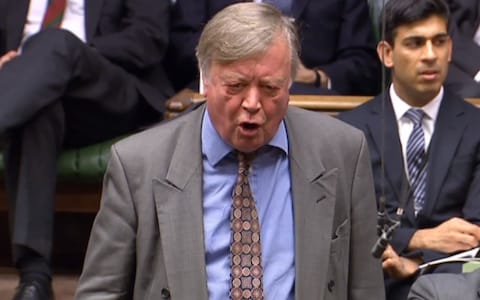 Above, The “Father of the House”, Kenneth Clarke in the Commons.
Above, The “Father of the House”, Kenneth Clarke in the Commons.
With Brexit and so many other things happening at the same time (they always are – Ed.) it was the seriousness of the situation at HM Prison Birmingham that managed to foist itself as a headline in the mainstream media and terrestrial TV broadcasters.
There will be much opinion on the whys and the wherefores and who was to blame and what is to be done about it. However essentially, the problem has been summed up superbly by Ken Clarke, a man who has held the cabinet posts of Chancellor of the Exchequer and Home Secretary – amongst others.
Ken knows that there are ways in which a government can raise money:
1. Taxes.
2. Borrowing.
3. Printing money.
4. “Robbing” Peter to “pay” Paul.
Of the four only two are really viable. These are 1. and 4. 2. has the problem that those who lend the money want interest on their repayments and the money has to be repaid at some point. To see what problems 3. can lead to one word only need be used: Venezuela!
Thus it is that democratic politicians spend a lot of time and put a lot of effort into trying to raise as much as they can in taxes without costing them those all important votes. It is also why they spend a lot of time and put a lot of effort into taking money from areas of public expenditure that the public are not too exercised about into those areas they are exercised about!
“Classics” insofar as popular areas are the NHS, Welefare and Education.
“Cinderella” areas include Defence (until British troops are sent into action with obsolete and/or inadequate kit) and Prisons. Prisons are the ultimate “Cinderella” area of British politics. When the mainstream media and terrestrial TV broadcasters reported upon the terrible situation at HM Prison Birmingham, you can be sure that most members of the Liberal Democrats and the Green Party were appalled. However most ordinary Britons would take the attitude: “If the criminals don’t like the conditions; then they shouldn’t have committed their crimes in the first place!” There is also a common belief that if prison conditions are harsh and severe then this will have the effect of discouraging those incarcerated from re-offending. Those who have professional experience of the criminal justice system will know that this widely held belief amongst the uninformed is erroneous.
In fact, the opposite is true. Good (clean, safe) conditions in prisons backed up by services to prisoners to enable them to deal with their addiction, mental health, anger management and education issues will result in a low rate of re-offending. However such conditions are very expensive and very few countries have put them in place. One of the few countries is Norway.
However, any Liberal Democrat or Green who thinks they can introduce such a regime into the UK – bearing in mind the above mentioned financial constraints know to all civil servants – are being about as unrealistic as the Unfortunate Gerard Batten who feels that a “hard Brexit” will be good for the UK!
So to repeat two FACTS:
– Good prison conditions will lower the crime rate.
– Someone will have to pay for these!
One partial solution is to reduce prisoner numbers by reducing the numbers of prisoners sent to prison by the courts and those prisoners who are sent to prison are sent for a lesser period. This of course is very unpopular with most voters who insist that the punishment they want to see handed out is as the Americans say, “jail time”.
They regard suspended sentences with an unpaid work requirement as “getting away with it”. It is not of course.
Politicians like Ken Clarke accept the logic of this but also the political reality that it is unpopular.
The ONLY way out of this predicament is an agreed consensus – namely that the Tories and Labour and the Lib Dems agree to a sentencing reform package that reduces prison numbers and face down in unity the inevitable public backlash that will be fanned by the tabloids. Of course parties such as UKIP will exploit this.
Speaking the Truth unto the Nation
